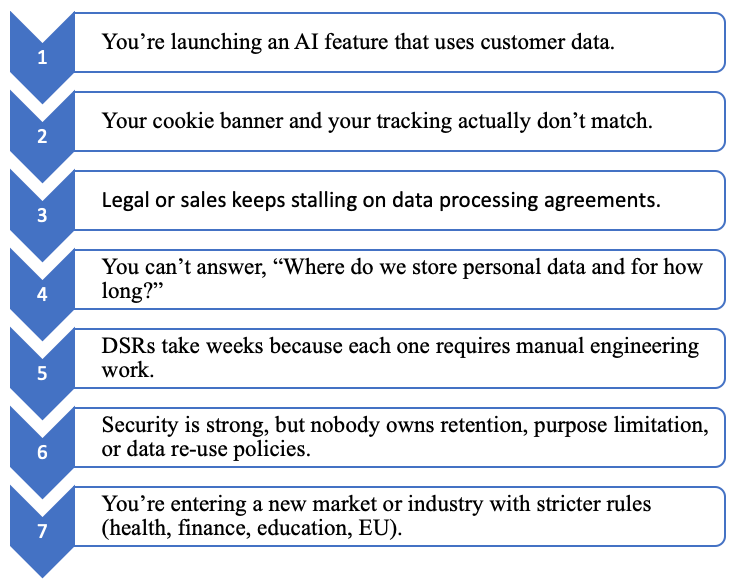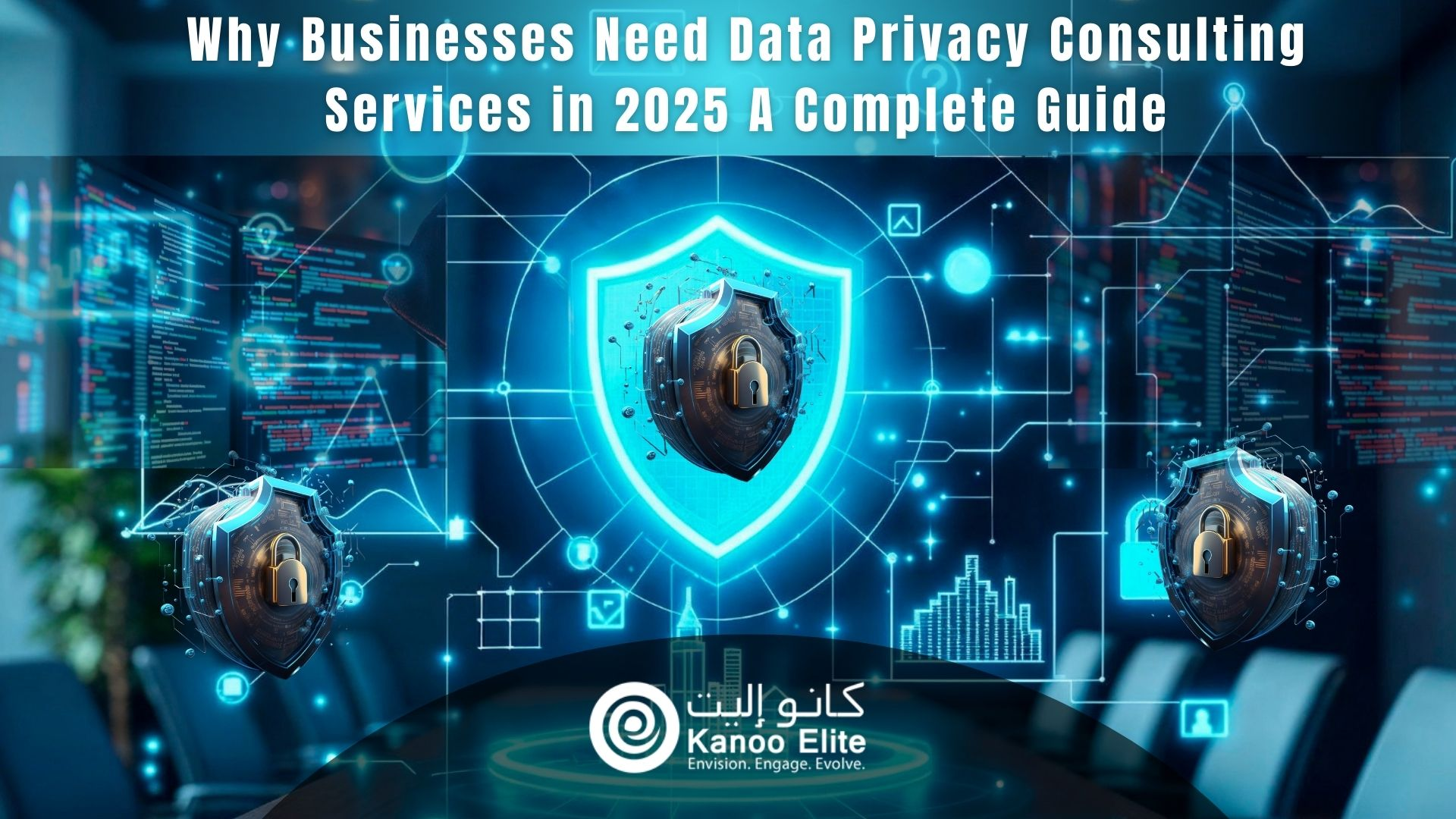Data privacy used to be “legal fine print.” In 2025, it’s a frontline business risk and a brand differentiator. Customers expect control over their data, regulators are stepping up enforcement, and AI-driven analytics make it easier than ever to over-collect or misuse information without meaning to. Whether you’re a startup building your first product or an enterprise untangling legacy systems, expert data privacy consulting is no longer a “nice-to-have”—it’s operational insurance and a growth enabler.
This guide breaks down why privacy consulting matters now, what good consultants actually do, and how to choose the right partner for your organization.
The 2025 Privacy Reality Check
1) Regulation has gone global. Companies now face a patchwork of privacy laws across regions and industries. Even if you don’t operate internationally, your processors, cloud vendors, or customers likely do. Practical translation: you need consistent, scalable privacy practices that travel.
2) AI changes everything. Generative and predictive AI systems depend on data pipelines that are often opaque. Questions like “What training data did we use?” and “Can we explain this outcome?” are now core privacy (and ethics) questions. Consultants help you implement data minimization, purpose limitation, model governance, and human-in-the-loop controls.
3) Third-party risk is your risk. From martech tags and SDKs to outsourced analytics, your data flows through a mesh of vendors. A single misconfigured integration can expose millions of records. Consultants pressure-test your supply chain with due diligence frameworks and contractual controls.
4) Security ≠ privacy (but they’re best friends). Strong security prevents unauthorized access, but privacy governs why you collect data, how long you keep it, and who can use it for what. You need both—security tools without privacy policies still create legal and reputational exposure.
5) Customers reward trustworthy brands. Transparent, respectful data practices reduce churn and improve conversions—especially in consent-heavy journeys like account creation, newsletters, and checkout. Privacy-by-design isn’t just compliant; it’s good UX.
What Data Privacy Consultants Actually Do
A strong privacy consultancy isn’t just a policy factory. Think of them as your multidisciplinary pit crew—legal, security, product, UX, and data engineering—helping you build durable, auditable privacy operations.
Here’s what that looks like in practice:
- Data mapping & inventory: Catalog systems, datasets, flows, and purposes. Identify sensitive data, special categories, and cross-border transfers. This is the foundation for everything else.
- Gap assessment: Compare your current state to regulatory requirements and industry standards. Prioritize fixes by risk and business impact.
- Privacy governance: Define roles (e.g., DPO, privacy champions), decision rights, escalation paths, and steering committees. You can’t scale privacy without governance.
- Policies & notices: Draft pragmatic, readable policies (internal and external), consent notices, retention schedules, and cookie banners that align with how your product actually works.
- Privacy by design: Embed requirements into product development—checklists, design patterns, and engineering controls (e.g., minimization, pseudonymization, differential privacy where appropriate).
- Data subject request (DSR) automation: Stand up processes and tools to handle access, deletion, and correction requests within statutory timelines—without derailing your support team.
- Vendor & contract reviews: Standardize DPAs, SCCs/transfer tools where needed, and continuous vendor monitoring. Align commercial terms with privacy obligations.
- Training & culture: Tailored, role-based training for engineers, marketers, support, and leadership. Make privacy part of everyday decisions, not a yearly slideshow.
- Incident readiness: Build playbooks that cover detection, triage, containment, notification, and evidence capture. Practice with tabletop exercises.
- Metrics & assurance: Define KPIs (e.g., DSR SLAs, retention deletion rates, privacy review coverage) and recurring audits to prove program effectiveness.
Signs You Need Privacy Consulting—Now

Benefits You Can Quantify
- Reduced regulatory exposure: Avoid fines, yes—but also costly remediation and forced product changes.
- Faster sales cycles: Privacy-ready documentation accelerates vendor reviews and enterprise deals.
- Lower operating costs: Clear retention schedules and automation shrink storage and manual DSR workloads.
- Higher conversion: Honest, minimal, and well-timed consent flows improve opt-ins and reduce drop-offs.
- Stronger incident response: Practice and playbooks turn chaos into controlled action.
How to Choose the Right Privacy Partner
- Industry fit: Do they understand your sector’s data types and workflows (e.g., adtech, SaaS, healthcare, fintech)?
- Tech literacy: Can they talk data models, SDKs, and CI/CD—not just case law? Ask how they operationalize privacy in code reviews and pipelines.
- Balanced approach: Look for teams that blend legal and engineering. Purely legal advice often isn’t buildable; purely technical advice may miss regulatory nuance.
- Tool-agnostic pragmatism: They should recommend tools, not force a one-size-fits-all platform. Ask for their “buy vs. build” decision rubric.
- Evidence of outcomes: References or case studies that show reduced DSR times, improved audit results, or faster enterprise onboarding.
- Enablement focus: A good consultant builds your capability—playbooks, templates, and training—so you’re not dependent forever.
Common Pitfalls—and How Consultants Help Avoid Them
- Collecting “just in case” data: Minimize by default; challenge every field. If it’s not tied to a documented purpose, don’t collect it.
- Copy-paste policies: Generic templates rarely match real data flows. Consultants validate against your actual systems.
- One-and-done compliance: Privacy is a program, not a project. Build recurring reviews into release cycles and vendor renewals.
- Ignoring marketing stacks: Tags, pixels, and SDKs can silently break compliance. Implement tag governance and consent-aware loading.
- Shadow IT and rogue spreadsheets: Inventory and guardrails curb risk from ad hoc exports and unmanaged data lakes.
Privacy, Security, and Trust: Three Sides of the Same Triangle
Think of privacy as intent, security as protection, and trust as the result. You can ship fast and innovate with AI and respect users—if you bake privacy into design decisions. Consultants provide the frameworks, artifacts, and muscle memory to make that sustainable at scale.
Getting Started: A Compact Checklist
- Appoint an accountable owner (DPO, privacy lead, or a cross-functional committee).
- Map data flows and systems; identify sensitive categories and transfers.
- Align notices, consent, and actual tracking behavior.
- Define retention and deletion schedules; automate where possible.
- Standardize DPAs and vendor reviews; monitor changes.
- Implement privacy-by-design gates in product and engineering.
- Stand up a DSR process with tooling and SLAs.
- Train teams and run an incident response tabletop.
- Measure, report, and iterate quarterly.
Final Word
In 2025, data privacy is not merely about “avoiding fines.” It’s about operational excellence, user respect, and competitive advantage. The right data privacy consulting partner helps you move from scramble-to-comply to privacy-as-a-core capability—so you can innovate confidently, sell faster, and earn durable trust.



